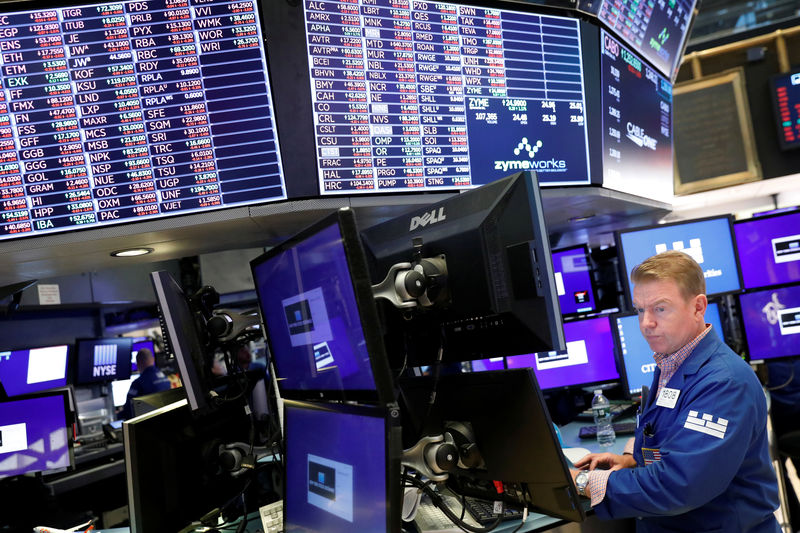By Akanksha Rana
(Reuters) - A rise in technology stocks lifted Wall Street on Thursday, as China sounded hopeful of a resolution to the protracted trade dispute with the United States, easing investor fears of the risk of a recession.
China's commerce ministry said both sides are discussing the next round of talks scheduled in September and hoped U.S. officials could cancel the planned additional tariffs to avoid an escalation, boosting sentiment and driving global stocks higher.
U.S. President Donald Trump said in a Fox News radio interview that trade talks were scheduled for Thursday "at a different level," but did not provide additional details.
Tariff-sensitive tech stocks (SPLRCT) jumped 1.60%, boosted by gains in Apple Inc (O:AAPL) and Microsoft Corp (O:MSFT).
Chipmakers which draw a large part of their revenue from China also gained, with the Philadelphia chip index (SOX) up 2.5%. Among the few losers were defensive utilities (SPLRCU) and consumer staples (SPLRCS) sectors.
"Markets are trading on hopes because they (U.S., China) are going to be talking and for the time being things aren't getting worse," said Larry Adam, chief investment officer at Raymond James in Baltimore.
"China is giving the U.S. another chance because we have seen weaker data coming out of both sides and it is important for them to extend the olive branch."
Top gainer among S&P 500 (SPX) companies was Dollar General Corp (N:DG), up 9% after raising its full-year profit forecast.
European Central Bank policy maker Klaas Knot said the euro zone economy did not warrant a resumption of bond purchases, Bloomberg reported, which saw markets cut some gains but quickly regain ground a few moments after.
At 11:19 a.m. ET, the Dow Jones Industrial Average (DJI) was up 280.13 points, or 1.08%, at 26,316.23, the S&P 500 (SPX) was up 31.42 points, or 1.09%, at 2,919.36. The Nasdaq Composite (IXIC) was up 110.68 points, or 1.41%, at 7,967.56.
Still, Wall Street's main indexes are on course to record their worst monthly performance since a selloff in May, spurred by worries that tit-for-tat tariffs will drive the global economy into a recession.
Those fears came to the fore after the U.S. yield curve inversion deepened earlier this week to levels not seen since 2007.
Investors are awaiting the monthly jobs report and manufacturing data next week, which will provide guidance on the likelihood of another rate cut from the Federal Reserve at its mid-September meeting.
The Trump administration on Wednesday made official its additional 5% tariff on $300 billion in Chinese imports and set collection dates of Sept. 1 and Dec. 15, prompting several hundreds of U.S. companies to warn of price hikes.
A number of companies, including Best Buy Co Inc (N:BBY) and Abercrombie & Fitch Co (N:ANF), that reported results earlier in the day warned of the impact from tariffs on their sales.
Shares of the U.S. consumer electronics retailer slid 9.5%, to the bottom of the S&P 500, while those of the teen retailer tumbled 15.9%.
Advancing issues outnumbered decliners for a 4.03-to-1 ratio on the NYSE and a 3.06-to-1 ratio on the Nasdaq.

The S&P index recorded 21 new 52-week highs and no new low, while the Nasdaq recorded 31 new highs and 29 new lows.